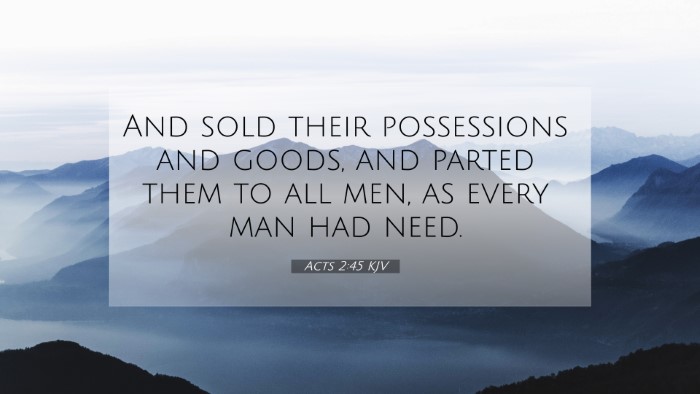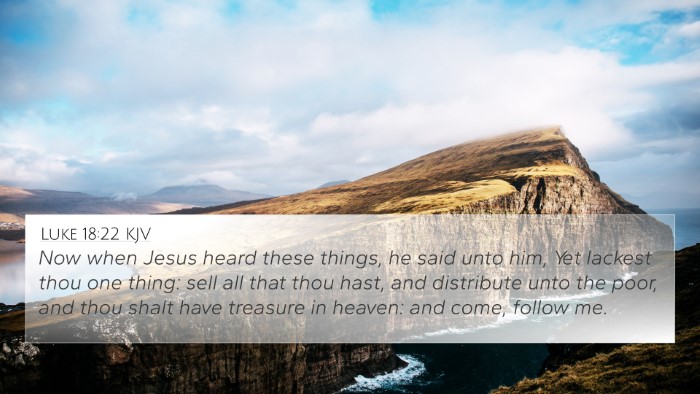Understanding Acts 2:45
Acts 2:45 states, "And sold their possessions and goods, and parted them to all men, as every man had need." This verse captures the essence of communal living within the early Christian church, highlighting themes of generosity, unity, and communal responsibility.
Contextual Background
The early church, initially comprised of Jews who accepted Jesus as the Messiah, experienced profound transformations after Pentecost. The outpouring of the Holy Spirit inspired them to live out their faith in tangible ways, one of which was a commitment to sharing their possessions with one another.
Key Insights from Commentaries
- Matthew Henry:
Henry emphasizes that this shared community spirit was indicative of the deep love and unity among the believers. The act of selling possessions was not merely about physical assets but about spiritual wealth and mutual support. Such selflessness is a testament to their faith in God’s provision.
- Albert Barnes:
Barnes notes that this level of communal generosity demonstrates the transformation that the Holy Spirit facilitated in their hearts. The act of dividing goods reflected a deep commitment to the wellbeing of others, which is foundational to the Christian lifestyle.
- Adam Clarke:
Clarke points out that this was a voluntary act and should not be misconstrued as a requirement for salvation. It serves as a moral and communal obligation arising from genuine faith. He emphasizes the importance of individual need being met through a collective effort.
Biblical Verse Cross-references
Acts 2:45 can be understood better through the lens of several other verses that reflect similar themes of generosity and community:
- Acts 4:32-35 - This passage further highlights the sharing of resources among believers and shows the unity of spirit.
- 2 Corinthians 8:13-15 - This emphasizes fair distribution based on needs, aligning with the principles seen in Acts 2:45.
- Matthew 25:35-40 - Jesus teaches about serving the needy as serving Him, underscoring the call to help those in need.
- Galatians 6:2 - "Bear one another's burdens," a verse that echoes the responsibility believers have to support one another.
- 1 John 3:17 - Highlights the importance of acting in love toward those in need.
- Hebrews 13:16 - Encourages believers to do good and share, reinforcing the value of generosity.
- Luke 3:11 - John the Baptist calls for sharing with those in need, establishing a scriptural precedent for generosity.
Thematic Connections in Scripture
The themes of sharing, communal responsibility, and generosity found in Acts 2:45 are deeply interwoven throughout the entirety of the Bible. These themes relate to various aspects of Christian living, and some of the important connections include:
- Generosity as a Form of Worship:
1 Chronicles 29:14 reminds believers that everything belongs to God, and sharing resources is an act of sincere worship.
- Unity in Diversity:
1 Corinthians 12:12-27 discusses the body of Christ, emphasizing how different believers work together for common goals.
- Provision and Trust:
Psalms 55:22 invites believers to cast their burdens on the Lord, indicating that true provision comes from Him, allowing for greater generosity.
Application for Today
In modern Christian practice, Acts 2:45 serves as a radical reminder of the call to love and support one another economically and spiritually. The verse challenges contemporary believers to examine their own practices regarding generosity and community support, potentially inspiring similar acts of kindness and sharing within local churches and broader communities.
Exploring Connections Through Cross-referencing
Understanding Acts 2:45 within the broader context of the Bible is essential for grasping its full meaning. Cross-referencing related verses can shed light on how this early church model serves as a template for Christian living today:
- Through the lens of Acts 4:32-35, we see how unity among believers leads to transformation and communal blessing.
- Proverbs 19:17 teaches that generosity toward the poor is a means of lending to the Lord.
- Cross-referencing between the Acts and Epistles provides a foundational understanding of the trajectory of early Christian practices.
Ultimately, the insights offered by public domain commentaries reveal Acts 2:45 not just as a historical account but as a dynamic and ongoing discussion about the nature of Christian community and the imperative of generosity in living faith.




















